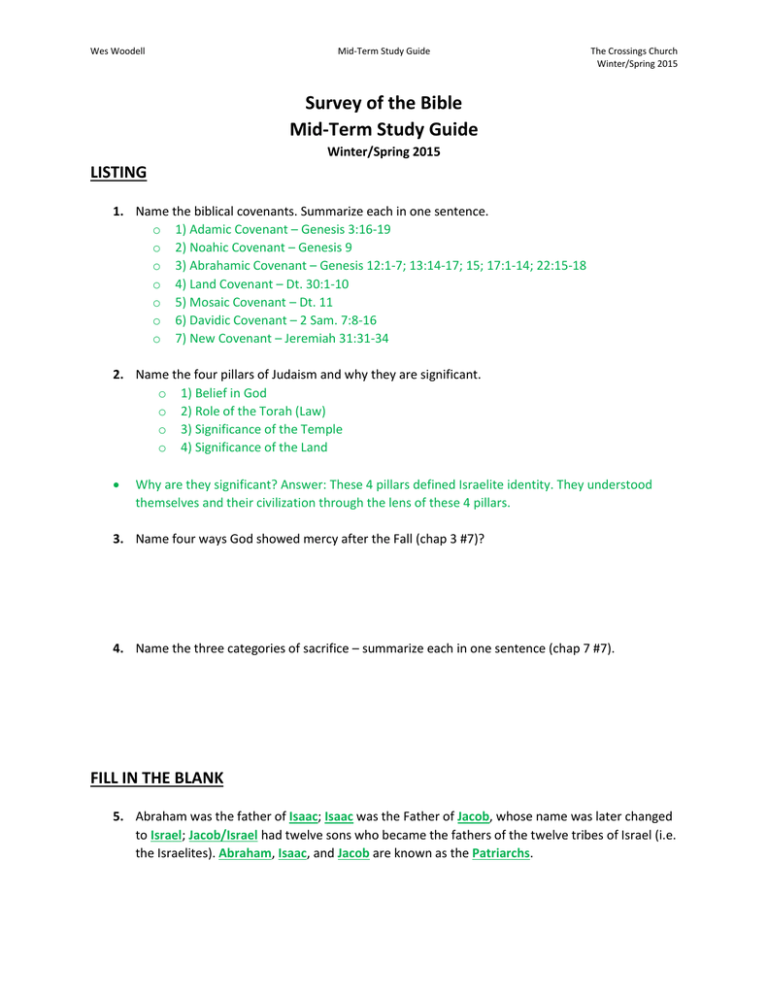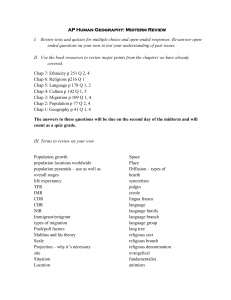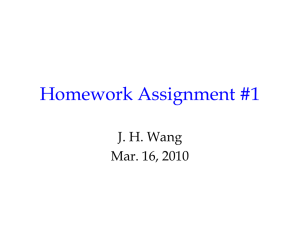Midterm Study Guide - Campus Ministry United
advertisement

Wes Woodell Mid-Term Study Guide The Crossings Church Winter/Spring 2015 Survey of the Bible Mid-Term Study Guide Winter/Spring 2015 LISTING 1. Name the biblical covenants. Summarize each in one sentence. o 1) Adamic Covenant – Genesis 3:16-19 o 2) Noahic Covenant – Genesis 9 o 3) Abrahamic Covenant – Genesis 12:1-7; 13:14-17; 15; 17:1-14; 22:15-18 o 4) Land Covenant – Dt. 30:1-10 o 5) Mosaic Covenant – Dt. 11 o 6) Davidic Covenant – 2 Sam. 7:8-16 o 7) New Covenant – Jeremiah 31:31-34 2. Name the four pillars of Judaism and why they are significant. o 1) Belief in God o 2) Role of the Torah (Law) o 3) Significance of the Temple o 4) Significance of the Land Why are they significant? Answer: These 4 pillars defined Israelite identity. They understood themselves and their civilization through the lens of these 4 pillars. 3. Name four ways God showed mercy after the Fall (chap 3 #7)? 4. Name the three categories of sacrifice – summarize each in one sentence (chap 7 #7). FILL IN THE BLANK 5. Abraham was the father of Isaac; Isaac was the Father of Jacob, whose name was later changed to Israel; Jacob/Israel had twelve sons who became the fathers of the twelve tribes of Israel (i.e. the Israelites). Abraham, Isaac, and Jacob are known as the Patriarchs. Wes Woodell Mid-Term Study Guide The Crossings Church Winter/Spring 2015 SHORT ANSWER, MULTIPLE CHOICE, TRUE/FALSE NOTE: Short answer means you provide a SUMMARY ONLY – that is, each answer should consist of only one sentence – two maximum. Most of these questions will be presented in short answer format on the test, though they MIGHT be presented in a multiple choice of true/false format. Be prepared for mostly short answer though – one sentence answer, maximum two. 6. What’s the difference between the traditional/conservative view and the modern/liberal view of biblical interpretation (week 1; introduction questions #1-4)? 7. What is the value of archaeology to biblical studies (introduction #5), and what are some its limitations (introduction #6)? 8. What is the traditional view of how the Bible was written, and how does it different from the “modern” view (chap 1 #1-2)? 9. What is the significance of the Dead Sea Scrolls (chap 1 #6)? 10. What does it mean to say humankind was created in the image of God (chap 3 #1)? 11. In what ways did Abraham fall short, and how did he pass his greatest test (chap 4 #3, 6)? 12. Who was Joseph’s father? Why did Joseph not get along with his brothers? What is the significance of Joseph to the Biblical record (chap 5 #’s 6, 8)? 13. Why is the dating of the Exodus important (chap 6 #1)? 14. How did God use Moses to teach the Egyptians a lesson (summary statement only - chap 6 #45)? 15. What is The Passover and why is it celebrated (chap 6 #5-6)? 16. What happened at the Red Sea (chap 6 #7)? 17. How was the Law both a covenant and a form of teaching (chap 7 #1-2)? 18. What was the purpose of the priesthood (chap 7 #8)? 19. What led to the Israelites 40 years of desert wandering (chap 8 #3)? 20. Why wasn’t Moses allowed to enter the Promised Land (chap 8 #5)? 21. Why and how did the nation renew its covenant with God across the river from Jericho (chap 8 #8)? 22. Who succeeded Moses in leading the Israelites, and what was his/her primary mission? 23. Why was Canaanite religion detestable to God (chap 9 #2)? 24. In the book of Deuteronomy, what did God warn the people over and over again NOT to do in order to continue being blessed by Him? 25. What happened within one generation of the Israelite’s inheriting the Promised Land (chap 10 #1)? 26. Describe the Israelite’s sin cycle and God’s response in the book of Judges (chap 10 #2). 27. Why did the Israelites decide they needed a king (chap 11 #3)? 28. Did God believe Israel having a king was a good idea? 29. Who was the first king of Israel? Overall, was he good or bad and why? 30. Who was the second king of Israel? Overall, was he good or bad and why? 31. What did God look for in a king (chap 11 #6)? 32. How did David demonstrate human weaknesses (chap 12 #6)? 33. What is the significance of the Davidic Covenant (2 Sam. 7:8-16), and why is it important to the story of the Bible? Wes Woodell Mid-Term Study Guide The Crossings Church Winter/Spring 2015 34. What was Solomon’s greatest building project, and why was it so significant (chap 12 #10)? 35. Why did the northern tribes leave the kingdom of Israel (chap 13 #1), and what was the main thing Jeroboam did to establish a separate identity for the North (chap 13 #2)? 36. What nation eventually dismantled the Northern Kingdom, and what did they do to some of the people (chap 13 #13)? 37. Which kingdom had the most good kings according to the Bible - the Northern Kingdom or the Southern Kingdom? 38. Which Kingdom maintained control of Solomon’s Temple? 39. What nation eventually dismantled the Southern Kingdom? What key location was destroyed and plundered, and what did they do with some of the people (chap 14 #13)? 40. Why was Lamentations written (chap 14 #15)? 41. What was the function of the prophets during the time of the exile? 42. What allowed the people initially to return to their land (chap 16 #15)? 43. What are the primary two books of the Bible associated with the return to and rebuilding of Jerusalem after the exile? 44. How does the final book of the Old Testament end? ESSAY (be prepared to answer any three of these) NOTE: Essays generally include an introductory paragraph, three paragraphs making up the body, and a conclusion. 45. Respond to the statement, “If your God is really a God of love, why didn’t he create a perfect world?” 46. Summarize the different views on the seven days of creation in Genesis 1 (chap 2 #4) – which do you prefer and why? 47. What is the significance of the Abrahamic covenant, first for the nation of Israel then for the Bible as a whole (chap 4 #2)? 48. What was the function of a prophet, and how was that function fulfilled (chapter 13 #6)? 49. In what ways was the exile following the destruction of the Jewish Temple the lowest point in Israelite history? 50. Summarize Daniel 2 and explain its significance in the overall story of the Bible.






